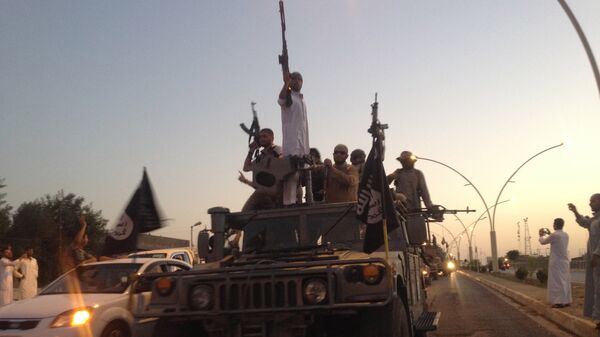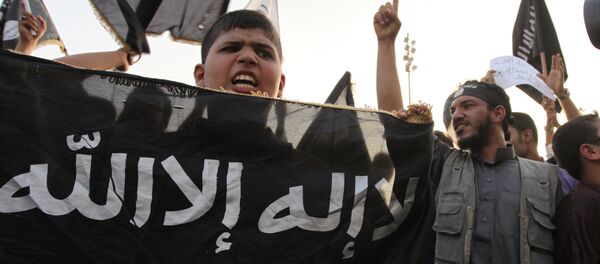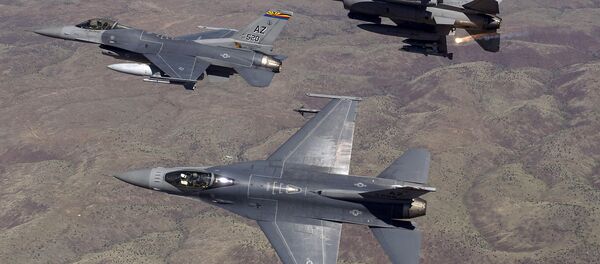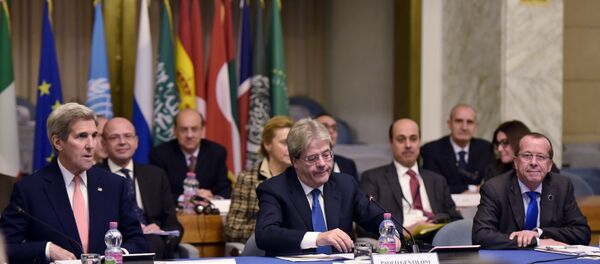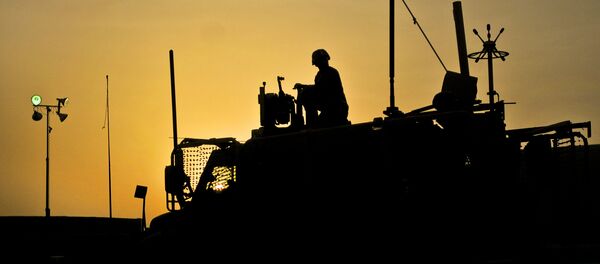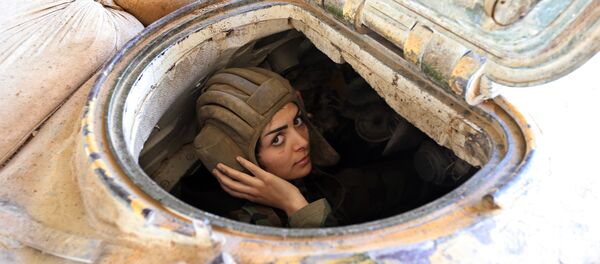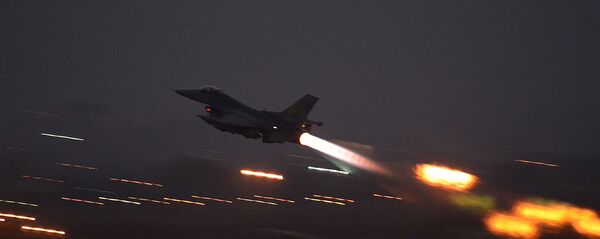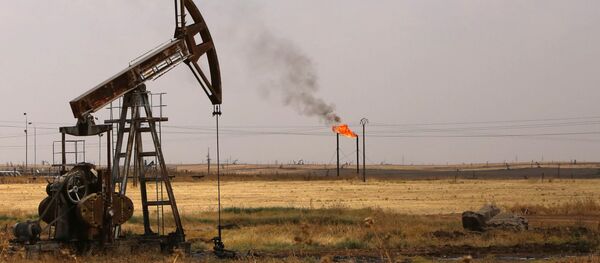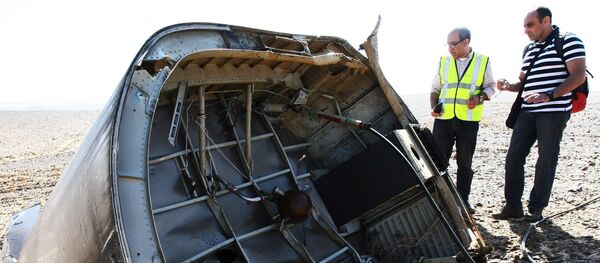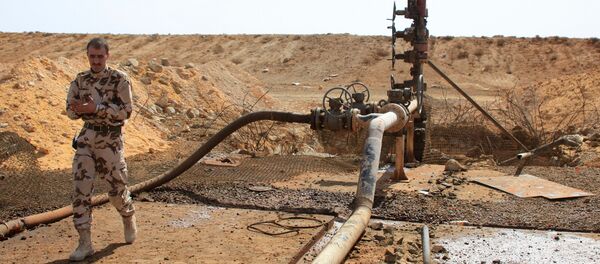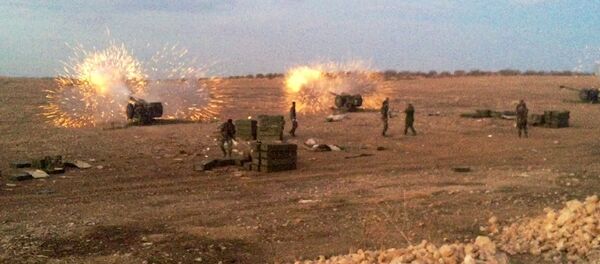MOSCOW, December 15 (Sputnik) – Formally declared a caliphate in Syria and Iraq by its leader Abu Bakr Baghdadi in June 2014, Daesh’s tentacles extend to Afghanistan, Libya, Yemen and Egypt. Cells of the Sunni fundamentalist group are known to be spread across Europe and the United States.
Daesh has claimed responsibility for terrorist acts in France, Denmark, Saudi Arabia, Turkey, Egypt, Lebanon, Mali and Tunisia, among other countries, in 2015.
Its killings have prompted world leaders to join forces in their efforts against terrorism and brutality.
Recruitment, Online and on the Ground
Daesh's online presence is thought to have persisted, if not grown, in the face of regular account bans by Twitter and an online war waged against Daesh by the Anonymous hacking collective.
A Brookings Institution think tank report, published in March, identified between 46,000 and 90,000 Twitter accounts as being used by Daesh supporters at the time.
In a February interview with Sputnik, the US Council of Muslim Organizations' (USCMO) secretary general, Oussama Jammal, argued in favor of raising awareness of Daesh's use of social media to deceive, lure and radicalize young Muslims to limit its effectiveness.
Out of some 31,000 foreign fighters thought to be in Iraq and Syria, 5,000 are believed to have come from Western Europe, while slightly less, some 4,700, are estimated to have traveled from the Commonwealth of Independent States (CIS). In descending order, Tunisia, Saudi Arabia, Russia, Turkey and Jordan are the five largest contributors of foreign fighters to Daesh, according to TSG.
Local estimates put the number of Syrian children recruited by Daesh in the first quarter of 2015 at around 400, a figure confirmed by a UN special representative for children and armed conflict in mid-November. Over 1,100 children under the age of 16 were believed to have joined the "cubs of the caliphate" by mid-2015, dozens of whom have subsequently died on the battlefield.
Daesh has published a series of photographs this year depicting children launching short-range rockets, as well as shooting and beheading their victims.
Local Threat
Following Daesh's advances on Syrian and Iraqi towns and villages, thousands of religious minorities have been displaced and hundreds taken hostage, including religious leaders, women and children.
The "death cult" released a video in February depicting the execution of 21 Egyptian Coptic Christians in Libya. Days later, Daesh burned 45 Iraqis to death, including members of the country's security forces.
Sexual abuse, including rape, enslavement and forced marriages, is believed to be widespread in Syria and Iraq. In late August, the UN Security Council condemned sexual violence toward women as a grave breach of the Geneva Conventions.
Media and watchdog reports accused the terrorist organization of using banned chemical weapons in early and mid-2015 attacks on Kurdish Peshmerga forces in Syria and Iraq.
In an interview with Sputnik in August, a Organization for the Prohibition of Chemical Weapons (OPCW) spokesman, Malik Ellahi, warned that Daesh's possession of chemical weapons posed a global threat.
Terrorist attacks continue to claim lives throughout the territories held by Daesh in Syria and Iraq. Suicide blasts and mass shootings, most notably in Turkey and Lebanon, have shaken security structures in dozens of neighboring countries, as well as across the Middle East and North Africa.
Threat to Europe
Europe has not escaped Daesh's long shadow — with fears that the migrant crisis as well as European nationals returning from combat in Syria and Iraq could pose a terrorist threat, in addition to homegrown extremism stoked by Daesh propaganda.
Daesh later claimed its "soldiers of the caliphate" had carried out the three deadly terrorist acts.
In mid-February, a gunman with reported ties to the terrorist group opened fire during a free speech seminar and again at a synagogue in Denmark's capital, Copenhagen, killing two civilians, before being shot dead by Danish police.
A shooting spree at a Tunisian museum, for which Daesh claimed responsibility, took the lives of 23 people, including 20 foreign tourists. In late June, mostly British, German and Belgian nationals fell victim to another mass shooting at a Tunisian resort that killed 39 tourists.
Daesh, which issued a call for attacks against "infidels" during the holy month of Ramadan, claimed the act was carried out by one of its fighters. The fundamentalists' call is believed to have inspired a "lone wolf"-style attack in France, where a man decapitated a driver of a car before driving it into a US-owned gas factory warehouse in Lyon, France.
An investigation into the attacks uncovered a European-wide network of extremists stretching beyond France to Belgium, Germany and the United Kingdom.
Following the massacre, France, part of an existing US-led coalition, dramatically increased its airstrikes against the extremist group in Syria, with French President Francois Hollande declaring the terrorist attack an "act of war."
Lawmakers in the United Kingdom approved airstrikes in Syria in early December in the wake of the Paris attacks. Likewise in Germany, lawmakers approved a military campaign in Syria, committing up to 1,200 troops, six surveillance planes, a refueling aircraft and a frigate to support France's flagship aircraft carrier, which had previously been deployed to the eastern Mediterranean.
Yet despite the efforts of these European governments, the same TSG report listed 1,800 fighters as having arrived to Iraq and Syria from France, 760 each from the United Kingdom and Germany, and 470 from Belgium, to fight alongside Daesh.
Failed US Strategy
Daesh continues to gain ground in the two crisis-torn countries nearly a year and a half after a coalition of 62 countries, led by the United States, started airstrikes against its positions.
By mid-September the number of fighters has dwindled to single digits, "four or five" according to US Central Command Commander Lloyd Austin. Austin said the Pentagon were concerned that the trainees may have defected to join Daesh and other extremist groups.
In early October, the Pentagon announced the suspension of the program after reports emerged of US-trained fighters being overrun and surrendering US-issued weapons to Nusra Front terrorists.
In early December, Joint Chiefs of Staff Vice Chairman Gen. Paul Selva told the US Senate Armed Services Committee that roughly 40 percent of US sorties returned each day without having struck any Daesh targets.
US House Foreign Affairs Committee Chairman Ed Royce said early in October that Russia has carried out more military operations in Syria since the end of September than the United States had managed to do in nearly a year and a half.
The US-led campaign is being carried out without a UN Security Council mandate or permission from the Syrian government.
The Federal Bureau of Investigation (FBI) estimates that over 150 US nationals have succeeded in joining Daesh in Syria. FBI Director James Comey said in October that his agency continues to identify individuals who seek to join the ranks of foreign fighters in the terrorist organization.
Homegrown Terrorists, Lone Wolf Attacks in US
Despite President Barack Obama’s pledges to combat terrorism not only abroad but also at home, US House Homeland Security Chairman Mike McCaul noted in December that a sharp uptick in extremist activity has made 2015 "the single most active year for homegrown terror we have ever seen."
Monitoring groups have long warned of "lone wolf" terrorist attacks on US soil inspired by Daesh, adept at online recruitment and incitement.
The jihadist group claimed credit for a May 4 armed attack on a controversial Prophet Muhammad cartoon contest exhibit in Garland, Texas. The suspected gunmen are believed to have self-radicalized through online propaganda, carrying out the attack after been inspired by calls for jihad.
Investigators uncovered a three-year history of planned and abandoned terrorist plots.
Tashfeen Malik, wife of Syed Rizwan Farook, was found to have pledged allegiance to Daesh in a Facebook post under an alias.
The terrorist act shifted US rhetoric beyond the Paris attacks, which had already prompted over half of US state governors to declare their opposition to accepting Syrian refugees over fears of extremist infiltration.
Russian Anti-Daesh Campaign in Syria
On September 30, the upper house of the Russian parliament approved unanimously the use of the country's air force in Syria to combat terrorism a year after the US-led coalition launched its mission. The limited-scope operation was requested by Syrian President Bashar Assad, and a Baghdad Information Center was established to coordinate the aerial campaign between Russia, Syria, Iraq and Iran.
Russian President Vladimir Putin has regularly ruled out the deployment of Russian ground forces in the anti-Daesh campaign.
Simultaneous to launching the airstrikes, Russia submitted a UN Security Council resolution to coordinate anti-terrorist efforts. The resolution was adopted unanimously after its second submission on November 20.
The air campaign involves Sukhoi Su-25, Su-24M and Su-34 attack aircraft, with the support of Su-30 jets, Tu-95MS, Tu-160 and Tu-22M3 bombers, as well as four of the Caspian Sea Flotilla's destroyers.
The United States opened deconfliction lines of communication with Russia ahead of the airstrikes to avoid potential "misjudgment and miscalculation" in Syrian airspace.
The Syrian Armed Forces have repeatedly hailed the Russian air campaign, saying the airstrikes have inflicted irreparable damage on the terrorists in Syria.
Daesh Threat to Russia
On October 31, the Russia-owned Kogalymavia airliner crashed in the Sinai Peninsula en route from an Egyptian resort to St. Petersburg, leaving no survivors among the 224 passengers and crew.
Daesh's affiliate known as the Sinai Province claimed responsibility for the crash.
The Russian Federal Security Service later confirmed that a bomb had caused the Airbus A321 to break apart in midair, leading to the deadliest disaster in the history of Russian civil aviation.
In September, the Russian Foreign Ministry's Department for New Challenges and Threats said the United States continues to block Russia's proposal to include Daesh as an independent entity on the UN Security Council's sanctions list. Over 300 individuals and entities associated with terrorism figure on the UN Security Council's regularly updated "Al-Qaida Sanctions List."
Daesh is outlawed in Russia as a terrorist organization.
State Sponsors
An IHS analysis, published in December, estimates that Daesh generates about $80 million in monthly revenues, 43 percent of which it derives from oil smuggling. Around half its income is netted through taxation and confiscation. Drug smuggling, electricity sales and donations account for the rest, according to the study.
In February, Russia submitted a draft resolution to cut off sources of funding going to Daesh, which the UN Security Council adopted unanimously.
The Syrian Foreign Ministry accused Turkey, as far back as April 2014, of providing direct logistical and military support to terrorist groups operating in northern Syria.
At a meeting with French President Francois Hollande on November 26, Putin spoke about the "industrial-scale" oil supplies being transported from Syrian territories occupied by Daesh to Turkey, with the implicit support of the political leadership in Ankara.
Turkish President Recep Tayyip Erdogan has regularly denied accusations of his or his family's direct involvement in the illicit Daesh oil trade. Russian Deputy Defense Minister Anatoly Antonov derided Erdogan's denials, claiming he would continue to refute the allegations "even if his face is smeared with smuggled oil."
General Staff Chief of Main Operational Directorate Lt.Gen. Sergei Rudskoy said space reconnaissance discovered no less than 8,500 trucks transporting up to 200,000 barrels of Daesh oil daily, most of them entering Turkey from Iraq.
Lavrov vowed that day to formally present the evidence to the United Nations and other interested parties.
UN Security Council Resolution 2249, adopted on November 21, defines Daesh's illicit oil trade, along with its attacks and destruction, as constituting a "global and unprecedented" threat to international peace and security.
Outlook
Though it remains to be seen whether global efforts will contribute to the defeat of Daesh in 2016, state leaders are seen to be coalescing to bring an end to its atrocities.
With growing acknowledgment that the current migrant crisis and terror threats largely stem from the Syrian conflict, world and regional leaders convened in Vienna late in 2015 to search for a means to end the nearly five-year war.
The 20 negotiators, known as the International Syria Support Group (ISSG), agreed that government and opposition forces would hold UN-sponsored negotiations by January 1, 2016.
Russian envoy to the UN Vitaly Churkin has indicated that an expanded UN Security Council sanctions regime, targeting terrorist funding, might be introduced by December 18.

